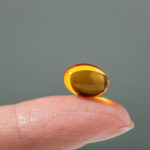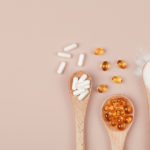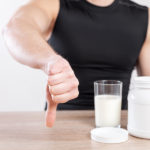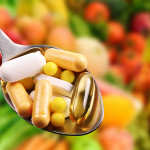By Bonnie Jenkins, Advanced Natural Wellness
Men hoping for monster muscles used to be the only people who routinely used amino acid supplements. But not any more. Today, these protein precursors are popping up all over the place. The amino acid taurine puts the pep in Red Bull energy drinks. And baby boomers nosh on nutritional bars boasting arginine, an amino acid that helps lower cholesterol and tame hypertension.
Yes, supplemental amino acids have come a long way from bodybuilding. Can they help give your health a boost? It’s possible, but only if you take them properly.
Protein Precursors and Amino Acid Supplements
Amino acids are most often described as the building blocks of protein. By stringing together the different aminos, the body constructs roughly 50,000 unique proteins, which are responsible for a jaw-dropping 75 percent of your body mass – everything from a strand of hair on your scalp to the nerve endings in your pinkie. Indeed, every single organ, tooth and bone in your body depends on amino acids to stay healthy.
The human body is ingeniously designed to keep its stock of amino acids full. Of the 20 the body needs, the liver manufactures 11. These are called nonessential amino acids – not because they aren’t important, but because the body churns them out on its own. The other nine, known as essential amino acids, are gleaned from plant and animal proteins in our diet – and some people take them as supplements.
So, what are the odds that your diet is lacking one of the essential nine? Because of the role meat and dairy play in the standard American diet, most of us don’t experience a deficiency. Still, even in the land of plenty, amino acid deficiencies do occur. Those who tend to fall short are people who under eat – the critically ill, crash dieters, extreme athletes who eat too little and exercise too much, and sometimes the elderly. Those with digestive problems, such as irritable bowel syndrome and ulcerative colitis, can also be at risk, since these conditions inhibit amino acid absorption. Signs of deficiency include fatigue, a weakened immune system, and injuries that refuse to heal.
Open your arteries, improve blood flow for a new health miracle...
Did you know your circulatory system has over 60,000 miles of arteries, veins and other blood vessels, if stretched end to end?
But as you age, your blood vessels undergo changes, which may cause them to stiffen, thicken and get clogged.
GOOD NEWS! Doctors have now identified a “Miracle Molecule” inside your arteries that helps OPEN your arteries and IMPROVE blood flow.
It’s what Dr. Valentin Fuster calls it, "One of the most important discoveries in the history of cardiovascular medicine."To you, that means...
- Healthy blood pressure
- Sharper mind and memory
- Skyrocketing energy and muscular strength
- Increased pleasure and passion in the bedroom
- Improved circulation to every cell and organ in your body
Go here to discover a new natural way to significantly boost the levels of this miracle molecule in YOUR body NOW!
The Supplement Controversy
So, should you supplement? It could give you an edge, even if you aren’t deficient. For instance, a short course of arginine can increase your sex drive. Glutamine can boost the immune system. And 5HTP can help you sleep. Others have used arginine to treat hypertension and taurine for congestive heart failure.
The importance of amino acids to brain function makes these nutrients of particular interest to practitioners who deal with mental disorders. While the majority of amino acids make protein, a few work in the brain as neurotransmitters. Single amino acid supplements, such as taurine and 5HTP, can also be extremely helpful for people with mild to moderate anxiety.
Just don’t go overboard. Overloading the body with one amino acid can crowd out one or more of the remaining 19. A special molecule carries amino acids from the gut to the liver. That molecule is like a bus with only so many seats. Put in too many of any one “passenger” and there is less room for the others. Without ready pools of all 20 amino acids, the body isn’t able to create the proteins needed to keep things running smoothly. Indeed, a deficiency of one amino acid may force the body to tear down muscle protein to glean enough amino acids for basic metabolic functions – a condition called negative nitrogen balance. Signs of a long-term imbalance include weight-loss and muscle wasting. More severe symptoms of a protein deficit include depression, digestive ills, and growth problems.
If you want to try supplemental amino acids, it’s best to work with a nutritionist or integrative physician experienced in their use. And bear in mind several precautions. Many experts recommend alternating two months on, two months off, to avoid developing an imbalance. Food inhibits absorption, so wait at least an hour between taking an amino acid and eating. And always follow recommended dosages unless otherwise instructed, since several amino acids, including aspartic acid, glutamic acid and homocysteine, are toxic when taken in large quantities.
Amino Acid 411
Here’s the scoop on five popular amino acid supplements that have shown promise either in scientific studies or clinical practice.
Are You Suffering From...
- Love handles and a pot belly
- Romance that isn't what it used to
- Forgetfulness and inattention
- Low (or no) strength and endurance
- A sex drive that's shifted into neutral...or worse
If so...you may have Mature Male Burnout. Click here to discover more about this unique condition and what you can do about it.
Arginine: This amino acid is most often associated with heart health. It raises blood levels of nitric oxide (a compound that expands blood vessels), keeps arteries pliable, and enhances blood flow. Three small trials have found that taking supplemental arginine improved symptoms of congestive heart failure. Other studies suggest it may reduce cholesterol, and also lower blood pressure in those with mild hypertension. For heart disease, take 2,000 to 3,000 mg. per day.
Taking supplemental arginine can also perk up your sex life. In one study of 50 men with erectile problems, half swallowed 5,000 mg. of arginine daily while their counterparts took a placebo. Six weeks later, a greater number of men in the amino acid group than in the placebo group reported enhanced “sexual performance.” In a similar study of postmenopausal women with lackluster libidos, those taking 6,000 mg. of arginine noted a greater improvement in sexual response than their counterparts taking the dummy pills. To boost your love life, take 5,000 mg. an hour before sexual activity no more than once a week.
5HTP: Made from the seeds of the griffonia plant, 5HTP is used as a weight-loss aid and mood lifter, as well as a sleep inducer. Research on this amino acid is still in its infancy; in two recent reviews of more than 200 clinical studies, researchers concluded that the lack of quality trials made it impossible to support or refute 5HTP-related claims. But it may be worth a try, if you don’t want to use prescription antidepressants or sleep aids. Take up to 50 mg. daily for depression; for insomnia, take the same amount, but at night.
GABA: The body generates GABA, or gamma-aminobutyric acid, from another amino acid called glutamic acid. It works by muffling neuronal activity in the brain and soothing frazzled nerve cells. For anxiety, take 1,000 to 2,000 mg. daily.
Taurine: This energy-boosting amino acid helps shore up cell membranes in your brain and heart. For years, scientists noticed a correlation between lagging levels of taurine and heart attack deaths. As a result, Japanese cardiologists regularly give heart attack victims up to 6,000 mg. of taurine a day to buttress wounded heart muscles.
But, even healthy people can benefit from taurine’s energy-boosting potential. In a review of three studies of a popular energy drink containing taurine, researchers found that people who drank the beverage had quicker reaction times, longer attention spans, and better short-term memories than those who consumed other drinks, like water or soda pop. For a quick energy boost, take 1,500 mg. a day.
Carnitine: There seems to be some confusion about whether or not carnitine is technically an amino acid. But it looks and acts enough like one that it is often lumped in with amino acids. It’s gleaned primarily from meat and dairy foods and is best known as a fat catalyst – meaning it transports molecules from the body’s fat stores to cells looking for energy to burn.
Carnitine has long piqued researchers’ interest as both a weight-loss enhancer and stamina booster, particularly in patients suffering from long-term ailments. The National Center for Complementary and Alternative Medicine is currently studying whether or not carnitine can boost energy levels of patients undergoing treatment for cancer. It also holds promise as a memory enhancer, especially when paired with acetic acid, a substance that resembles a brain chemical used for memory. Numerous studies show that taking up to 1,500 mg. per day of acetyl-L-carnitine eases the symptoms of early Alzheimer’s disease, especially in patients under 65.
One Last Thing …
One nonessential amino acid is worth a mention. Glutamine is credited with building, repairing, and maintaining the body’s thousands of muscles. But, in addition to fortifying muscles, glutamine is used by white blood cells that help the immune system ward off disease. A few small studies show that supplementing with 1,500 to 6,000 mg. of glutamine daily may help prevent the post-race infections that plague professional athletes.
Another promising application is for HIV patients; studies have shown that those taking glutamine supplements were better able to maintain a healthy weight. If you have HIV, consult your physician before adding glutamine supplements to your routine.
Research Brief …
Women accustomed to taking iron supplements may want to stop when they hit menopause. Too much iron can up your risk of heart disease, liver cancer, and, according to one study, Parkinson’s disease. It’s best to get no more than the RDA, which is 8 mg. a day, the amount in one-and-a-quarter cup of cooked spinach.
If, on the other hand, you’re suffering from unexplained fatigue and suspect that you might be anemic, have your doctor check your iron levels before taking a supplement. If you are deficient, opt for an over-the-counter iron supplement instead of a prescription, which can be a bit pricy.
References:
den Boer JA, et al. “Behavioral, neuroendocrine, and biochemical effects of 5-hydroxytryptophan administration in panic disorder. Psychiatry Research. 1990;31:267-278.
Epis R, et al. “Modulatory effect of acetyl-L-carnitine on amyloid precursor protein metabolism in hippocampal neurons.” European Journal of Pharmacology. 2008;597:51-56.
Powers KM, et al. “Parkinson’s disease risks associated with dietary iron, manganese, and other nutrient intakes.” Neurology. 2003; 60:1761-1766.
Seidl R, et al. “A taurine and caffeine-containing drink stimulates cognitive performance and well-being.” Amino Acids. 2000;19:635-642.
Stanislavov R, et al. “Improvement of erectile function with Prelox: a randomized, double-blind, placebo-controlled, crossover trial.” International Journal of Impotence Research. 2008;20:173-1






